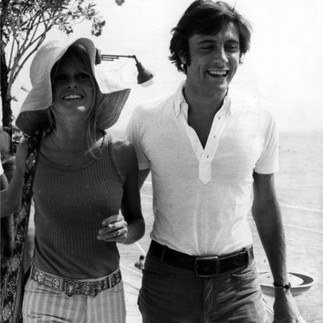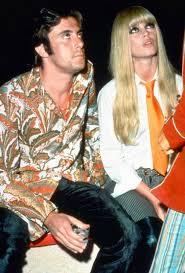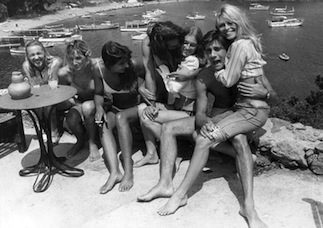Gigi Rizzi: The Playboy King of Saint-Tropez and the Hedonistic Riviera of the 1960s and 70s

In the sun-drenched paradise of the French Riviera during the 1960s and 70s, Gigi Rizzi stood as a central figure in a world defined by glamour, indulgence, and carefree abandon. Born in Piacenza, northern Italy, in 1944, Rizzi rejected the quiet, predictable future of his family’s brickmaking business and instead sought his fortune among the beautiful, wealthy, and famous on the Côte d’Azur. His good looks, natural charm, and impeccable sense of style quickly elevated him to the upper echelons of the Riviera’s party scene, where he became one of the most celebrated playboys of his era.

For Rizzi, life in Saint-Tropez was a canvas on which to paint a vivid, extravagant existence. The town had already gained a reputation as a hub of excess, drawing artists, aristocrats, and celebrities from across the world, and Rizzi fit in seamlessly with this milieu. He arrived with no fortune of his own, but with an audacity that saw him outshine even the wealthiest of his peers. As he once admitted, “We had to fight against the multimillionaires to conquer. All I had was my face, and that made the challenge even more exciting… we were poisonous.”

Together with a group of fellow Italians, Rizzi formed a tight-knit band of playboys known as Les Italiens, who made their mark on the Riviera’s nightlife. His companions included Beppe Piroddi, Franco Rapetti (known as The Prince), and Rodolfo Parisi, each of whom brought their own style and charisma to the group. Socialite Pilar Crespi Robert later described them as “the most good-looking, suntanned Italian playboys” who always had “beautiful American girlfriends” and a sense of glamour that set them apart from the rest of the crowd. They became synonymous with the style and spirit of the era, with their leather pants, open shirts, and chains epitomising the carefree, hedonistic lifestyle of the time.
For Rizzi, this was a period defined by spontaneous, pleasure-seeking adventures. His days and nights were filled with the finest things life had to offer – caviar, champagne, and beautiful women – and the parties stretched from sunset to sunrise. “I was dancing barefoot on tables, always out to win, never worrying about tomorrow,” he once wrote, perfectly capturing the carefree ethos that defined his existence on the Riviera. His parties were legendary, a constant whirl of glamorous guests, impromptu dancing, and endless drinks, all set against the backdrop of the Mediterranean’s golden coast. Whether at the iconic clubs like Le Papagayo and L’Esquinade or in private villas, Rizzi was always at the centre of the action.

Yet it was not just his partying that made him famous. Rizzi became a household name in 1968, when Newsweek included him among the notable people of the year, placing him alongside figures like Che Guevara. His renown was due in no small part to his relationship with Brigitte Bardot, the French actress and international sex symbol who was then one of the most famous women in the world. Their romance became the stuff of legend, capturing the attention of the international media and further cementing Rizzi’s reputation as the king of Saint-Tropez.
At the time of their affair, Bardot was 44 and Rizzi was 34. The age difference did nothing to dampen the intensity of their relationship. The couple was regularly spotted together at glamorous parties, moving seamlessly between exclusive events and private retreats. Sometimes they would wear matching pirate bandanas, an emblem of their rebellious spirit and carefree lifestyle. Together, they embodied the pinnacle of 1960s Riviera decadence: stylish, carefree, and utterly devoted to living life in the moment. Their relationship was a reflection of the wider ethos of the time, when traditional social norms were being upended in favour of personal freedom and pleasure.
However, Rizzi’s affair with Bardot wasn’t just a fleeting romance. He viewed it as one of the defining relationships of his life, one that lingered in his memory long after their time together had passed. In 2004, decades after their relationship ended, Rizzi wrote Bardot a touching letter on her 70th birthday, recalling the passion and excitement of their days together.
“Dear Brigitte, I am Gigi and I am writing to you from another world, another city and another life, if I look back I see the nights of Saint-Tropez, the confusion of the Esquinade, the magical and endless nights between the Escale and the Papagayo, and that night when we saw each other for the first time. Happy birthday, happy birthday. I still remember where you live, because I was there a long time ago, too, when we were full of joy, we kids with a big dream.”
Rizzi’s letter reflected the depth of his feelings, showing that, even after forty years, he still held their time together close to his heart.

Despite the allure of his love affairs and glamorous social life, Rizzi also had an entrepreneurial streak. In the early 1970s, he opened Number One, a nightclub in Milan modelled after the lavish, party-centric lifestyle of the French Riviera. The club quickly became a hotspot for Italy’s fashionable elite, a place where models danced barefoot on tables and the party continued until the early hours of the morning. For a brief period, Number One was the epicentre of Milan’s nightlife, echoing the decadent spirit of Saint-Tropez. However, the club’s success was short-lived. After a police raid uncovered cocaine on the premises, the authorities shut the club down just three years after it opened, a stark reminder of the darker side of the era’s indulgence.
By the mid-1970s, the carefree lifestyle that Rizzi had once revelled in began to lose its appeal. The era of endless parties and extravagant indulgence was fading, and Rizzi sensed that it was time for a change. He left behind the glitz and glamour of Saint-Tropez and moved to Argentina, where he settled into a quieter life on a farm. For two decades, Rizzi lived far removed from the world of high society, embracing a simpler, slower-paced lifestyle with his Argentine wife and their two children.
Yet, despite the distance he put between himself and his former life, Rizzi remained a legend in the social circles of the Riviera. When he returned to Italy in 2004, it was as a man who had lived through the highs and lows of one of the most extravagant periods in European history. His return was marked not by a desire to reclaim his former crown as king of the playboys, but by a quieter reflection on the life he had led. His days of partying were over, but his legacy endured, not just in the memories of those who knew him, but in the wider cultural memory of the era.

Rizzi passed away in Saint-Tropez in 2013, the town where his legend had first been born. His life, like the Riviera he had once ruled, was a testament to a particular moment in time – a period when beauty, indulgence, and freedom were paramount, and the future seemed like something that could wait. Though the world has moved on since those heady days of the 1960s and 70s, Rizzi’s legacy remains. He wasn’t just a playboy, or a man defined by his looks and charm. He was a symbol of an era, a man who lived life on his own terms, rejecting convention in favour of spontaneity, adventure, and passion.
In many ways, Gigi Rizzi’s life reflected the contradictions of the 1960s and 70s Riviera. It was a time of both excess and rebellion, of beauty and chaos, of moments that burned brightly but faded quickly. For Rizzi, as for so many others who were drawn to the Riviera’s shores, it was a time to live in the moment, to enjoy life without regret, and to throw oneself fully into the pursuit of pleasure. His relationships with women were often brief, but they were marked by a deep desire to connect with those who, like him, wanted to live life without limits. His parties were legendary, but they were also a reflection of a time when the future seemed far off, and tomorrow could wait. Rizzi’s story, though long past, continues to captivate as a reminder of a time when life was lived at full speed, with no thought for what came next.




























Comments